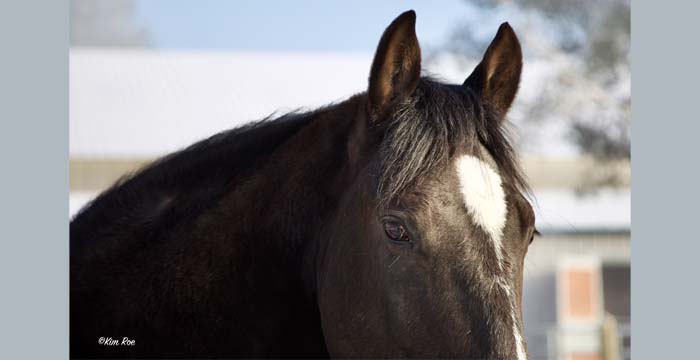Researchers[i] from the University of Guelph, Ontario, Canada, were looking for a non-invasive means to measure stress in horses. Horses can experience stress from a variety of sources including forage restriction, loss of a buddy, isolation, travel, unfamiliar environments, as well as excessive training.
While there are physiological and endocrine changes that can occur during stressful conditions, a simple approach is to examine the horse’s eyes. Eye blink rate and eyelid twitches have been used as an indicator of stress in humans but have not been examined in horses until now.
Thirty-three horses were exposed to three stressful conditions: separation from herd mates, denied access to feed, and startling by a new object. One group served as a control. For each stressor, eye blink rate and the number of eye twitches were measured. Heart rate was also assessed.
On average, horses performed full-blinks 8 to 9 times per minute in the absence of any stressors. When stressors were presented, this rate declined to 5 blinks per minute. Half-blinks, on the other hand, increased during stressful circumstances and they increased the most during feed restriction. Eyelid twitches also increased during stress—they were only about 2 per minute in the control group, increasing to 6 per minute during feed restriction.
While the herd separation and startling treatments did produce some changes, they were not statistically different from the control group. The most dramatic results occurred when horses were denied feed. In addition, horses experienced a more dramatic increase in heart rate, restlessness, and oral behaviors.
In conclusion, horses experiencing stressful situations will decrease their full-blink rate and increase their frequency of half-blinks and eyelid twitches.
Implications for Your Horses
The horse’s digestive tract is different from most other species, including dogs, cats, cattle, and humans. It is designed to have a steady flow of forage, lest horses develop ulcers, colic, and inflammatory conditions as they age. As grazing animals, they consistently need to chew and have access to hay and/or pasture, day and night. Without this, they will not only develop digestive disturbances, but will suffer hormonal stress responses that ironically lead to obesity, due to resulting insulin and leptin resistance. Cushing’s disease is also affecting horses at younger ages than usual due to stress-related inflammatory hormonal bombardment, as well as poor diet and exposure to toxins.
Stress takes its toll over time, and one of the most stressful circumstances a horse can endure is forage restriction.[ii] This study further supports this premise through examining physiological changes in the horses’ eyes and heart rate, as well as other behaviors.
[i] Study: Markies, K., Ready, C., Farkas, L., and Hodder, A., 2019. Eye blink rates and eyelid twitches as a non-invasive measure of stress in the domestic horse. Animals, 9, 562.
[ii] Articles in Getty Equine Nutrition Library address this issue:
- Restricting Forage is Incredibly Stressful: gettyequinenutrition.biz/library/restrictingforageisincrediblystressful.htm
- Respect the Power of the Horse’s Instincts: gettyequinenutrition.biz/library/respectthepowerofthehorsesinstincts.htm
- Forage Deprivation Keeps Your Horse Fat – The Research: gettyequinenutrition.biz/library/foragedeprivationkeepsyourhorsefat.htm
Juliet M. Getty, Ph.D. is an independent equine nutritionist with a wide U.S. and international following. Her research-based approach optimizes equine health by aligning physiology and instincts with correct feeding and nutrition practices. Dr. Getty’s goal is to empower the horseperson with the confidence and knowledge to provide the best nutrition for his or her horse’s needs.
Dr. Getty’s fundamental resource book, Feed Your Horse Like a Horse, is available in paperback and Kindle versions. The paperback version is available at www.GettyEquineNutrition.com — buy the book there and have it inscribed by the author.
Find a world of useful information for the horseperson at www.GettyEquineNutrition.com: Sign up for Dr. Getty’s informative, free e-newsletter, Forage for Thought, browse her library of articles and tips, listen to recorded interviews, and purchase recordings of her educational teleseminars and webinars.
You can reach Dr. Getty directly at [email protected].
Published in July 2020 Issue:

Juliet M. Getty, Ph.D. is an independent equine nutritionist with a wide U.S. and international following. Her research-based approach optimizes equine health by aligning physiology and instincts with correct feeding and nutrition practices. Dr. Getty’s goal is to empower the horseperson with the confidence and knowledge to provide the best nutrition for his or her horse’s needs. Learn more at www.gettyequinenutrition.com.





